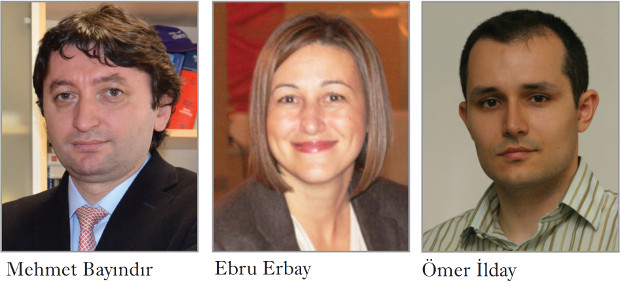
Three Bilkent University faculty members have recently received grants from the European Research Council (ERC). Assoc. Prof. Mehmet Bayındır and Asst. Prof. Ömer İlday were awarded ERC Consolidator Grants, and Asst. Prof. Ebru Erbay received an ERC Starting Grant.
The European Research Council aims to enhance the dynamic character, creativity and excellence of European research. Since the agency’s launching in 2007, more than 3,860 projects have been selected for funding from among more than 43,000 applications. The ERC counts seven Nobel laureates and three Fields medalists among its grant holders. Including this year’s three Bilkent recipients, only six Turkish researchers have received ERC awards since the program’s inception.
ERC funding programs are open to top researchers of any nationality or age who wish to carry out their pioneering research in any field of science, engineering and scholarship in the 28 EU member states or associated countries.
The ERC Consolidator Grant, which was awarded separately to Dr. Bayındır and Dr. İlday, aims to support researchers in consolidating their own independent research teams or programs. The grant is available to researchers of any nationality with 7-12 years of experience since completion of the PhD and a scientific track record showing great promise.
Dr. Bayındır, a faculty member in the Department of Physics and acting director of UNAM, received his grant for a proposal that focuses on the development of a novel fabrication technique based on top-to-bottom iterative size reduction in nanotechnology. Inexpensive, high-throughput, multi-material nanowire arrays pave the way for novel applications, including nanowire-based large-area flexible sensor platforms, phase change memory, nanostructure-enhanced photovoltaics, semiconductor nanophotonics, dielectric metamaterials, linear and nonlinear photonics and nanowire-enabled high-performance composites.
Dr. İlday, assistant professor in the Department of Physics, and his team have developed a method that allows creation of self-organized nanometer-scale patterns on material surfaces using a femtosecond laser. Their technique addresses a well-known problem regarding regularity of such self-organized pattern formation that had not been solved since the 1960s, allowing them to achieve unprecedented levels of regularity, even on curved or flexible surfaces. Dr. İlday has been awarded an ERC Consolidator Grant worth 2 million euros, which will provide the opportunity to develop these concepts further. With the grant, Dr. İlday aims to demonstrate laser-controlled self-assembly of a plethora of 2D patterns, crystals and quasicrystals alike, eventually assembled layer by layer into the third dimension — an important development in the direction of a 3D material synthesizer.
The ERC Starting Grant supports up-and-coming research leaders who are preparing to establish teams and begin conducting independent research. This grant program is for researchers with 2-7 years of experience since completion of the PhD and a scientific track record showing great promise. The 1.5 million euro Starting Grant received by Dr. Erbay, assistant professor in the Department of Molecular Biology and Genetics and a researcher at UNAM, recognizes her contributions to understanding the molecular basis of atherosclerosis, a vascular disease that is the leading cause of heart attacks. Dr. Erbay’s research group will explore the close molecular integration between the metabolic and immune systems that is required for systemic homeostasis and dysregulated in atherosclerosis, diabetes and obesity. Using a wide range of interdisciplinary approaches such as chemical genetics, transgenic mice, proteomics and RNA sequencing, they will aim to identify the precise molecular mechanisms linking metabolic stress to immune activation, discoveries that would pave the way to novel therapeutic approaches to this devastating disease cluster.
